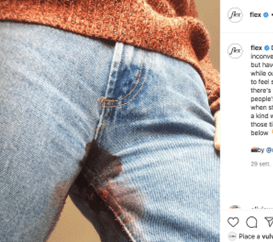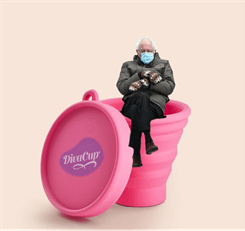
‘Chemicals are not for pussies!’ and ‘What’s between your legs?’. Two provocative slogans that appeared on large, colourful and eye-catching marketing posters spread across billboards in the Netherlands in 2014. They were slogans for the social enterprise start-up YONI bursting onto the scene. YONI, in fact, was not alone at the time. All over the world we saw similar social enterprises come up, using similarly disruptive strategies and being similarly very vocal about it in the process. Our study, published the Journal of Management Studies, began with this observation and aimed to explore how these social enterprises in the menstrual product industry used the stigma of menstruation to create the possibility for societal change.
Looking at the numbers, globally, over 300 million women and girls are on their periods every day. While, of course, menstruation is a natural physiological process, it is also one that for centuries has been subjected to stigmatization and cultural taboos, directly and indirectly affecting gender inequality, reproductive and general health, access to education, and career opportunities for girls and women around the globe.
Menstruation Stigma and Taboo: A Global Issue
What fascinated us particularly was the sheer number of social enterprises that have emerged in this space as well as their global reach. Besides YONI, this involved companies with funny or provocative names such as Aunt Flow, The Honey Pot, Boondh (‘drop’ in Hindi) or TOMT (‘Time of The Month’). Spread across all corners of the world, each of them in one way or another has been putting women’s needs at the centre of their businesses while actively challenging the stigma and taboo which surrounds menstruation. As one entrepreneur from Hygiene and you told us: ‘[Menstruation] isataboo subject and nobody wants to talk about it’. This sentiment was mentioned over and over again, with many entrepreneurs pointing to the pervasiveness of the issue. And one of the founders of aisle said: ‘Menstrual taboos express themselves in so many different ways, from hiding the product if you’re going to the bathroom to this notion of concealment as an imperative that nobody should know or there should be no visible evidence that you’re menstruating… It’s extremely pervasive’. What became soon apparent is that instead of doing the socially accepted thing and staying silent, all these entrepreneurs were consciously rocking the boat and were keen to challenge the menstruation taboo and stigma head on.
Intrigued by these observations, we conducted a qualitative study of 90 social enterprises around the globe, collecting documents, websites, social media communications and interviews. Our qualitative data brought us close to the experiences of these social entrepreneurs and gave us a good sense of the unique challenges that they encountered in a stigmatized industry that historically has been founded on the promises of discretion and concealment.
Women Entrepreneurs Challenging Societal Norms
As we progressed in our study, we realised a number of things: 1) almost all social enterprises were founded by women and, in their words, for women; 2) almost all social entrepreneurs talked about having a mission to ‘breaking the silence’ as the core of their ventures; and 3) almost all social enterprises drew on honest, colourful and provocative communication strategies based on text and images. Clearly, these entrepreneurial women are not shying away from talking about periods; instead, they actively put menstruation, menstruating people and menstruation products openly and clearly at centre of their venture – and often very visually. Comparing this with the traditional television advertisements for menstrual products which generally depict menstrual blood and discharge through the use of clear blue liquids, the honest communication from the social enterprises mentioning and showing red stains and bodily discomfort is refreshing, bold and revolutionary.
Instagram post, @flex

Mission-Driven Social Enterprises
So how do these social enterprises manage to successfully run a business despite being active in a deeply stigmatized industry? Our study connects to recent research showing that, rather than being a barrier or hindrance, stigma may provide important opportunities for organizations. In our case, we found that because the ventures are mission-driven social enterprises they are able to put addressing the menstruation stigma at the core of their business model and to disrupt the industry through their innovative products and services. Mission-driven social enterprises turn a societal issue into a business opportunity and that is what these bold female entrepreneurs have done. They each in their own way have developed a menstrual product or service, with the explicit intention to use that product or service to challenge existing negative symbolism, conventions and behaviour around it both in the
industry and in society.
Lunette website

Normalising Menstruation: How to Discuss an Issue that is Hard to Talk About?
Yet, being mission-driven alone is not enough. Given the deep-seated nature of menstruation stigma and the taboo surrounding it, how the social enterprises go about making space to have a conversation about the negative experiences women and girls encounter is also crucial to their success. As, generally speaking, the menstruation stigma and taboo have rendered menstruation a topic that is difficult to discuss, changing how society thinks about periods is immensely hard. Because of this, addressing the menstruation stigma and taboo requires, as we observed in our study, an indirect and non-conventional approach in order to circumvent the strict taken-for-granted societal rules. And this is exactly what we saw these social enterprises do: they combine clear and bold texts, with humorous or provocative visuals, which they put on their websites and social media platforms, and in doing so, are able to evade societal norms surrounding menstruation and make the issue visible and approachable.
Instagram post, @divacup


Instagram post @TheFemaleCompany
What Can We Learn from This?
What, then, are the biggest takeaways from our study? First, our study shows how taken-for-granted societal conventions may disproportionally affect certain groups in society and can have detrimental consequences. As highlighted, stigmatized and tabooed issues are hard to break away from and lead to inequality and marginalization. As a matter of fact, to make headway on a number of the UN’s sustainable development goals (SDGs), it is important to not only recognise the negative impact of stigmatized and tabooed issues across the world but also to address these through innovative solutions and business models so as to ultimately work towards, in the case of menstruation, gender equity (SDG5), reduced inequalities (SDG10), global health and wellbeing (SDG3), and quality education (SDG4). Of course, this is equally true for other stigmatized and tabooed issues such as poverty, mental health issues, or HIV/AIDS.
In addition, our study shows how entrepreneurs and others in the business world may contribute towards addressing stigmatized and tabooed issues in society. Given their hidden and concealed nature, it is crucial to think clearly about the strategies with which these issues may be addressed. Using visuals in combination with texts lends itself especially well to do so, as it makes something difficult to talk about more relatable.
Lastly, our study shows that by challenging stigmatizing societal norms, previously ‘invisible’ market opportunities may be found. In the case of the menstrual product industry, estimations indicate that revenues may hit around $47 billion worldwide by 2023 with an additional market growth of more than 5% over the next 5 years.
In all, the revolutionary social entrepreneurs who are breaking the pervasive stronghold of menstruation taboo and stigma, then, show us how to create a better world while radically innovating a whole industry. Honestly, who would find fault with that?

0 Comments